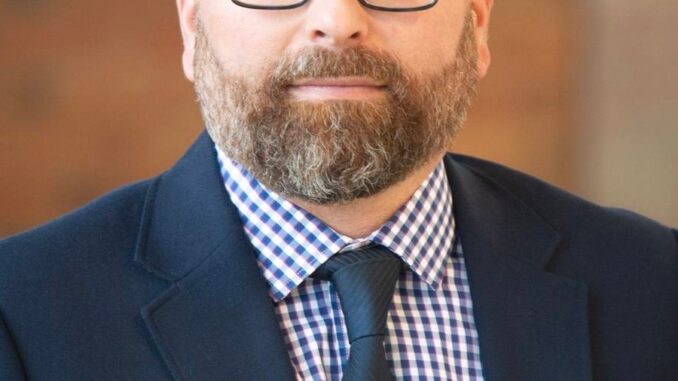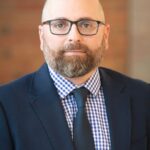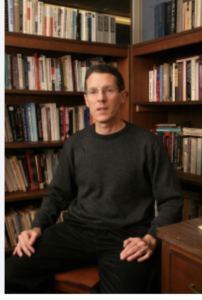
 We at the SJU English Blog are so excited in these early days of F24 to be profiling one of our distinguished alums who has gone on to thrive in the academic world. Dr. Mike Jacobs, who graduated from St John’s with his doctorate in 2012, is currently Provost and Vice-President of Monroe Community College, a part of the SUNY (State University of New York) system in Rochester. After his time at St. John’s, Dr. Jacobs has climbed the professional ladder from faculty to department chair to Dean and most recently Provost. As he shows in this interview, he has collaborated with with various institutions beyond SUNY, including the American Council of Learned Societies, the American Association of Colleges & Universities, and the Modern Language Association. He’s an amazing leader in and advocate for Community College education, an important and sometimes overlooked area of higher education in the USA. In sum – as you’ll see – he’s an academic rock star, and we at SJU English are very proud of him.
We at the SJU English Blog are so excited in these early days of F24 to be profiling one of our distinguished alums who has gone on to thrive in the academic world. Dr. Mike Jacobs, who graduated from St John’s with his doctorate in 2012, is currently Provost and Vice-President of Monroe Community College, a part of the SUNY (State University of New York) system in Rochester. After his time at St. John’s, Dr. Jacobs has climbed the professional ladder from faculty to department chair to Dean and most recently Provost. As he shows in this interview, he has collaborated with with various institutions beyond SUNY, including the American Council of Learned Societies, the American Association of Colleges & Universities, and the Modern Language Association. He’s an amazing leader in and advocate for Community College education, an important and sometimes overlooked area of higher education in the USA. In sum – as you’ll see – he’s an academic rock star, and we at SJU English are very proud of him.
Here’s our interview with Provost Jacobs –
When did you graduate from St. John’s? What degree(s) do you have from us?
I earned my Doctor of Arts in English in 2012. My concentration was American literary modernism—specifically documentary literature.
What thing that you learned at SJU English do you think has been most helpful to you in your post-SJU career?
This is a tough question as my time at SJU provided me so many lessons that have contributed to my career. I was already a full-time instructor at Berkeley College, a small, private, access-oriented institution in NYC, when I began my doctoral studies. Honestly, I thought I knew what I was doing in the classroom, but the English courses I took at SJU (particularly Composition Studies, Intro to the Profession, Research Methods, and Critical Theory) completely transformed the way I approached course design and delivery. This served me well when I made the transition to department chair (and then dean—and then Provost) as I had developed a more complete grasp of the academic and non-cognitive barriers faced by the student populations I have served throughout my time in higher education. I can also state unequivocally that my literature professors helped me cultivate an understanding of the human condition that’s proved invaluable in terms of what I deal with in my leadership role. Really, my weekly conversations with Steve Sicari on Ulysses taught me more about what motivates people than any ten books on organizational dynamics ever could.
What did your path look like from graduation to your current job?
While working on my dissertation, I became English department chair [at Berkeley College]—a role I continued until 2017, when I took the position of Dean, Humanities & Social Sciences, at (SUNY) Monroe Community College in Rochester. I spent the next seven years endeavoring to bolster and communicate the value of arts, humanities, and social sciences education, which largely comprised forging clear connections between those disciplines and our college’s institutional mission and strategic priorities. In 2018, I founded MCC’s Institute for the Humanities, which gave my division a platform for educating our campus and service region communities on the relevance of humanities education. I also became heavily involved with professional/scholarly organizations, including MLA and the Community College Humanities Association (I just ended my tenures as MLA’s Chair for the Committee on Community Colleges and CCHA’s Deputy Director of National Conferences), as well as the American Council of Learned Societies, and American Association of Colleges & Universities. Most recently, I have taken on the role of MCC’s Provost and Vice President of Academic & Student Affairs.
What does a typical day or week look like in your position?
As chief academic officer and chief student affairs officer, I oversee a division of approximately 1,2000 members of the faculty, staff, and administration. Consequently, I don’t really have typical weeks—though there are some common elements. I generally begin and end my day with emails—and in between, I try to provide as much guidance and support to my direct reports as possible (these include academic deans, associate vice presidents, directors, and executive assistants). So much of my day consists of meetings: monthly one-to-one meetings with my direct reports, the Faculty Senate President, the union president, and my fellow college officers; bi-weekly meetings with the president, my leadership team, the president’s cabinet, and the college officers; periodic meetings to discuss ongoing student success initiatives, etc.— most of which involves a balance of project development and management, strategic planning, and problem solving. In between and adjacent to all of that is the work of developing and managing our division’s priorities.
What is your favorite part of being in your current position?
Again, this is a tough one; there’s a lot I love about this job. If I had to pick just one thing, I guess it’s empowering really smart and talented people to make a difference in students’ lives. I know that’s cliché, but it’s nonetheless true. I get a tremendous amount of satisfaction sitting with a dean or AVP or English professor and collaboratively working through an idea that might positively impact student success outcomes in meaningful ways. So much of what we accomplish—like our ongoing initiative to improve first-year composition success rates, redesign of our academic advising model, or the work to address food insecurity among our students—often begins, takes form, and/or turns an important corner through collaborations in my office. That’s a pretty cool thing when considering the community college mission.
What are the most valuable skills you learned as an English major? How have they helped you post-graduation?
There’s no way to answer this question comprehensively, so I’ll focus on one thing that immediately comes to mind: the skill of artful and productive disagreement. I use this every day in myriad ways. The literature seminar course (here, I’m thinking back to those evening classes around the conference table in the basement of St. John Hall) provided me with the language and confidence (and habits of mind) to share my ideas and interpretations and challenge (respectfully) those with which I disagreed. It also taught me when to shut up and listen—to really hear what someone with a different perspective is saying. Most of what I gained in these respects I owe to my mentor, the late, great John Lowney. He had this ineffable way of challenging his students without discouraging them—but rather getting them to become more adept participants in the dialogic interplay of classroom literary debate.

What is your advice to other English majors?
I wasn’t an English “major” in the traditional sense; my bachelor’s and master’s degrees are in film (specifically documentary). So when I came to SJU’s doctoral program, I felt like I was really behind my peers who’d already read Foucault and Freire—and understood the difference between German and British Romanticism. But my background in film played a crucial role in my success as an English student. Film is text (I know I’m not breaking new ground with that statement), and the analytical/interpretive skills I developed as a film student served me well in the English program—in a number of ways. Not only did it equip me with a useful set of critical lenses and ways of thinking about aesthetics that I could apply to studying literature; just as important, it gave me a broader understanding of the history, politics, and cultural phenomena that influenced the authors and their works. And I guess I really lucked out being a modernist— as they were supremely influenced by the new medium of cinema. So I guess my advice would be to embrace the cross-disciplinarity of literary studies by becoming versed in those other academic disciplines and artistic forms that have shaped and continue to shape the prose, poetry, and drama on which you’re focused.

Leave a Reply